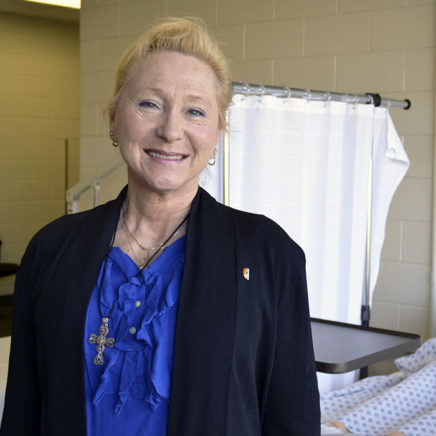
The Westside Service Center now opens its doors to job seekers, employers and nursing manikins. A cohort of 11 adults are enrolled in a 13-week certified nursing assistant (CNA) course at the service center and will hopefully walk out with a new job.
Unlike some of the other students, one student in the cohort has many years of personal and professional CNA experience already; she’s taken care of family members with cancer, her Down syndrome son and in-home clients battling stage 4 illnesses. Trudy Brenner entered the class not only to become recertified as a CNA, but begin a new chapter of her life.
“Even though my certification only lapsed last fall, this class is a challenge. I’ve already learned new terminology and had to brush up on familiar terms,” Brenner said.
The program is a partnership between West Michigan Works! and Michigan Career and Technical Institute (MCTI), the training arm to Michigan Rehabilitation Services (MRS). MRS works with individuals with disabilities to remove barriers to training and employment.
Custom classes
While most training facilities require an 8th grade reading and math level, MCTI develops curriculum for people whose skills are below the 8th grade level. The custom curriculum provides an opportunity for many individuals who wouldn’t normally be able to complete a training program or receive an industry certification.
“In today’s employment landscape, we have to focus on untapped sources of labor. The students in our programs are exactly that.” MCTI director Paul Mulka said. “With simple accommodations and restructured curriculum, the students with disabilities are given the opportunity to leave with promising careers ahead of them.”
The CNA program begins with a three-week pre-class workshop taught by Karen Riggs, West Michigan Works! talent development instructor. Participants will learn about soft skills and will be introduced to terms covered in the CNA class work. Hands-on exercises with classmates and manikins are essential to learning the skills covered in the class.
The additional instruction time, custom curriculum and testing accommodations set students up for success.
“MCTI has an incredibly high CNA certification pass rate. They plan two test taking times, which is very unique to this program. Any student who failed the first test receives additional instruction and review time before taking the test again. And 90% of students in their classes pass the test,” regional service center manager Brittany Lenertz said.
Toward the end of the class, students will meet with employers who are looking to fill CNA positions.
A new start
Brenner has faced a lot of adversity in her life. She’s a two-time cancer survivor and recently graduated from Mel Trotter’s rehabilitation program. She’s living in their transition housing while completing the CNA class and looking for permanent housing.
Because she’s able to take the class at no charge, she’s afforded a fresh start that she couldn’t otherwise afford.
“I feel called to be a CNA and help patients who are in their end of life journey or with special needs,” Brenner said. “A CNA is the major player in the care of a person. You see what’s going on with each patient that their doctor or nurse might not see. My job is extremely important and I take it very seriously.”
Her career goals don’t stop at a CNA either – she’s already looking at licensed practical nurse classes to complete next year.
More in the future
“Employers are looking for creative ways to fill high demand jobs. We are that creative solution,” Lenertz said.
With extra space in the service center and an overwhelming need for more spots in medical certification programs at training providers, the lab at Westside Service Center was born. Healthcare providers and training institutions can use the space to increase their short-term training class capacities, allowing for more students to graduate and enter into the unfilled, high demand jobs like CNAs.
The lab was built with additional amenities not needed for the CNA training, like sinks, to allow for future short-term trainings. Spectrum Health offered to provide the equipment needed to begin a Sterile Processing Technician program later this year.
Service Centers in Muskegon and Ottawa Counties are also partnering with education providers to offer similar solutions: Muskegon Community College and Thompson M-TEC (in Holland) both use space in the neighboring service center so they can offer more spots in their current CNA programs.
“I’m hoping we can do other short term training in the future that’s employer driven, specifically manufacturing and health careers. There’s a real shortage of people in the healthcare field and our aging population is only going to make the demand greater,” Mulka said.



